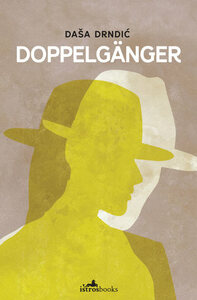You need to sign in or sign up before continuing.
Take a photo of a barcode or cover
challenging
dark
funny
reflective
sad
Plot or Character Driven:
Character
It’s a novella formed of two stories linked by major themes and minor details. There were nice moments but overall I didn’t love this.
In the first story “Artur and Isabella” the eponymous heroes are old and think their days of romance are behind them, until they meet. Drndić doesn’t skimp on the grotesque aspects of ageing, to the point of making me quite uncomfortable. The third person narrative alternates with brief police reports on the two lead characters, the reason for which becomes clear at the end. There’s also a tendency to include lists, which in a longer story can provide nice change of pace, but in something so short it was disruptive. I’m pretty sure this is meant to be a sad tale but I wasn’t at all emotionally involved.
Read my full review: https://www.noseinabook.co.uk/2020/04/20/quivering-like-jelly-quivering-like-a-small-bird/
In the first story “Artur and Isabella” the eponymous heroes are old and think their days of romance are behind them, until they meet. Drndić doesn’t skimp on the grotesque aspects of ageing, to the point of making me quite uncomfortable. The third person narrative alternates with brief police reports on the two lead characters, the reason for which becomes clear at the end. There’s also a tendency to include lists, which in a longer story can provide nice change of pace, but in something so short it was disruptive. I’m pretty sure this is meant to be a sad tale but I wasn’t at all emotionally involved.
Read my full review: https://www.noseinabook.co.uk/2020/04/20/quivering-like-jelly-quivering-like-a-small-bird/
dark
emotional
reflective
sad
slow-paced
Plot or Character Driven:
Character
Strong character development:
No
Loveable characters:
No
Diverse cast of characters:
No
Flaws of characters a main focus:
Yes
Daša Drndić has a very original, unedited, raw, way of writing. She has a way of opening the reader to the interpretation of the mundane, from toilet needs to pieces of chocolate spread around an entire apartment. Her sentences are short and snappy, and with a topic that reflects on loneliness, it makes sense that she would pick a style that is perhaps irritating and in your face.
This book is split into a short story and a novella, 'Arthur and Isabella' and 'Pupi'. You will find the connection between them as you carry on reading. They are each about older people who live in an isolated way, their habits, how they got here, and how this is affecting them.
I personally much preferred 'Arthur and Isabella' to 'Pupi'. Detail is mixed with the big picture in both of them, and in 'Pupi' I thought this was borderline too much. They are both stories that traverse history, personal life, old age and loneliness. Both set in former Yugoslavia, that speak about the condition of the new countries, briefly WW2, but I'd say they are more about personal aspects than wide contexts.
I really enjoyed the in your face writing, the honesty and not shying away of discussing everything. And if you want excellent descriptions of eating chocolate and hat collections, oh my is this good. I was craving chocolate throughout those pages and it had almost a meditative aspect to it. Definitely the most evocative and delicious chocolate descriptions I've ever heard!
Loneliness and old age I find are topics that are not paired as much in literature. Most protagonists tend to be young, and if they are older they are either surrounded by family or have a strong connection with one other person. Here we observe people who are either desperately trying to find someone who will give them this connection, or people who give themselves without expecting anything in return. Learning to live with oneself and the habits and image of self one develops is also fascinating.
A book about the extrinsic and intrinsic in loneliness - a very well done portrait.
This book is split into a short story and a novella, 'Arthur and Isabella' and 'Pupi'. You will find the connection between them as you carry on reading. They are each about older people who live in an isolated way, their habits, how they got here, and how this is affecting them.
I personally much preferred 'Arthur and Isabella' to 'Pupi'. Detail is mixed with the big picture in both of them, and in 'Pupi' I thought this was borderline too much. They are both stories that traverse history, personal life, old age and loneliness. Both set in former Yugoslavia, that speak about the condition of the new countries, briefly WW2, but I'd say they are more about personal aspects than wide contexts.
I really enjoyed the in your face writing, the honesty and not shying away of discussing everything. And if you want excellent descriptions of eating chocolate and hat collections, oh my is this good. I was craving chocolate throughout those pages and it had almost a meditative aspect to it. Definitely the most evocative and delicious chocolate descriptions I've ever heard!
Loneliness and old age I find are topics that are not paired as much in literature. Most protagonists tend to be young, and if they are older they are either surrounded by family or have a strong connection with one other person. Here we observe people who are either desperately trying to find someone who will give them this connection, or people who give themselves without expecting anything in return. Learning to live with oneself and the habits and image of self one develops is also fascinating.
A book about the extrinsic and intrinsic in loneliness - a very well done portrait.
I really liked this book. I love a book that rambles and follows someone's strange downfall.
The book was given to me as a gift and I had no preconceptions about the author or the text when I started reading it. A few pages in I started to form the opinion that Drndić might be a "Slavic Bukowski." The book's characters are mostly pitiful figures leading lives in wretched circumstances, their flaws and failures cast in the garish light of succinct, matter-of-fact narration. Once I had was roughly half way though the book, however, my opinion had completely changed, and I'm now rather embarrassed to have compared the Drndić to Bukowski simply on the grounds that the author has serious talent. This is especially evident in the second, longer part of the novel, titled "Pupi," which refers to the pet name of its main character, Printz Dvorsky.
As the plot of Pupi evolves, a second narrator begins to emerge from the text. Namely, in addition to the ever-present narrative voice recounting the history of the Dvorsky family in detached third person, Printz's narrative voice begins to assert itself. It is often as though the two narrators were competing with one another -- interrupting one another, repeating one another, or qualifying what the other has just said. The execution is masterful. It permits the reader the perspective of peering out at the world through the eyes of one whose life if unravelling over the course of the story's arc while observing the whole with out-of-body lucidity.
As the plot of Pupi evolves, a second narrator begins to emerge from the text. Namely, in addition to the ever-present narrative voice recounting the history of the Dvorsky family in detached third person, Printz's narrative voice begins to assert itself. It is often as though the two narrators were competing with one another -- interrupting one another, repeating one another, or qualifying what the other has just said. The execution is masterful. It permits the reader the perspective of peering out at the world through the eyes of one whose life if unravelling over the course of the story's arc while observing the whole with out-of-body lucidity.
Shocking bodily details, in the service of a pair of tales of those damaged by the 20th century’s great calamities. Formally inventive and jagged. Still thinking about this one...
challenging
dark
reflective
medium-paced
Strong character development:
Yes
Loveable characters:
No
Diverse cast of characters:
No
Flaws of characters a main focus:
Yes
Thank you to @istros_books for sending me a free copy of Doppelgänger by Daša Drndić to review! They have such an interesting array of translated literature from South Eastern Europe and the Balkans, so please do check them out if you're interested in broadening your reading horizons!
.
This is my first book by Drndić, and by any Croatian author in fact, and it's left me with a strong desire to read more of her work and learn more about the history of Croatia. The book is split into two stories, one rather short, Arturo and Isabella, and one much longer, Pupi. Arturo and Isabella is the more powerful of the two. The two eponymous central characters are 70-somethings who meet outside on New Year's Eve and enjoy a rather rogue-ish encounter. Their meeting is frequently disrupted by police reports, as they are both under surveillance by the police on account of their political pasts.
.
Pupi is a bit more meandering, as a now-vagrant man wanders through life trying to navigate his family troubles. Strange similarities with the first story begin to arise as the story progresses, hence the title. This is one of those books that would benefit from multiple readings to catch the nuances and coincidences you might have missed the first time around, especially if (like me) your knowledge of the historic and political context is not too hot.
.
I read a really interesting piece in Granta about Drndić's style, which she is very rigid about when it comes to the English translation! The first story is translated by S.D Curtis the second by Celia Hawkesworth, and both apparently emulate her style well. Drndić says her style is supposed to irritate the reader, and she doesn't want any changes made in translation to make it more palatable. Indeed, the rhythms and repetitions of her writing made me feel slightly panicked when I was reading it, like I was in the head of the anxious narrator, almost becoming them. It's quite unnerving and extremely impressive, especially given it's been reproduced in translation!
.
Overall I think it was a great introduction to Drndić's work, and I look forward to picking up more in the future!
The first story is very good. Disturbingly comic, curious and occasionally confusing. I was very geared up for the novella that followed. However, though it has moments that are engaging, I found it hard work - which I wasn't expecting in a fairly short piece. I also wondered if I was missing something and I was left wondering if there were connections between the stories and the books title that I had failed to link together. While there was plenty to enjoy and the book evoked some strong responses from me (mostly uncomfortable - and I mean this as a complement), I wasn't left fully satisfied by the book. Perhaps this was more to do with the reader than the writer. Regardless, worth reading as something outside my typical choice of literature.






